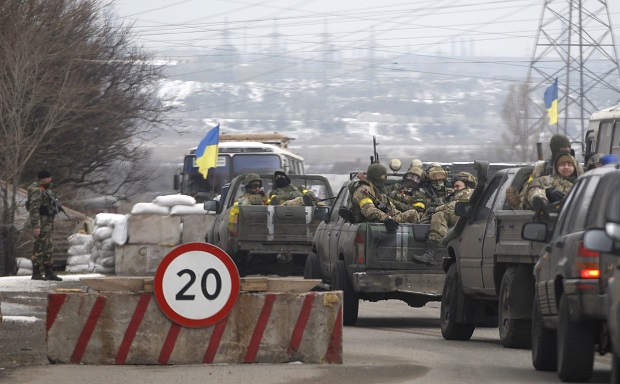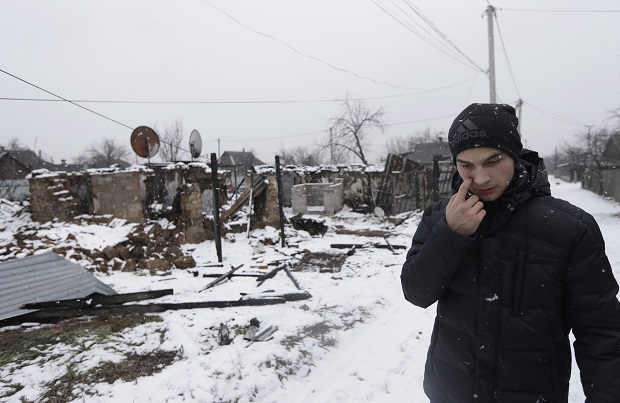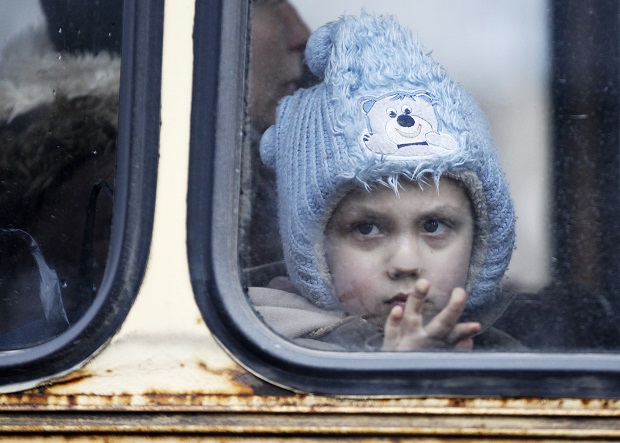Ukraine bloodshed intensifies ahead of peace summit

Ukrainian government troops sit in the back of pick-up trucks as they pass a checkpoint near the town of Mariupol, Ukraine, Tuesday, Feb. 10, 2015. The intense fighting, which the U.N. says has killed more than 5,300 people since April, comes ahead of a crucial summit including Western leaders on Wednesday as well as peace talks later Tuesday. The volunteer Azov battalion said on social media on Tuesday that it captured several villages northeast of the strategic port of Mariupol, pushing the rebels closer to the border with Russia. AP
KIEV, Ukraine – Intense fighting in Ukraine, including a devastating rocket strike on Kiev’s military headquarters in the east, killed at least 37 people on Tuesday, the eve of a four-way peace summit.
As diplomats scrambled to finalize a deal to end the 10-month war, US President Barack Obama held telephone talks with Russia’s Vladimir Putin and sought to further pressure him over Moscow’s alleged backing for Ukrainian rebels.
But even as diplomatic momentum built ahead of Wednesday’s summit, more deadly violence hit east Ukraine.
Ukrainian President Petro Poroshenko said rockets for the first time hit the military’s command center in Kramatorsk, the government’s administrative capital in the region, well behind the frontlines and far from rebel positions.
The strikes also hit residential areas around the city, killing 15 local residents, officials said. At least 63 people, including five children, were also wounded.
Article continues after this advertisement
In this picture taken, Monday, Feb. 9, 2015, Ruslan Banin, 18 years old, walks in his neighborhood in Donetsk, Ukraine. Day and night, mortars and rockets rain down on the rebel stronghold in eastern Ukraine _ mainly in the city’s outlying districts, where the poorest people live. AP
Kiev and the West accuse Moscow of supplying and training the heavily armed separatists, but Russia denies the claims.
Article continues after this advertisementRebels say their weapons have been captured from Ukrainian forces, although Kiev has cited numerous cases of the insurgents using advanced weapons that are only available from Russian arsenals.
“The shelling is with Vladimir Putin’s compliments, who else could have done this?” shouted a Kramatorsk resident as he walked past an unexploded rocket.
Debaltseve ‘encircled’
The latest fighting also saw rebels seek to encircle railway hub Debaltseve and Ukrainian forces launch a counter-offensive around the strategic port of Mariupol.
Apart from the rocket attack in Kramatorsk, another seven Ukrainian soldiers and eight civilians were reported killed in fighting over the last 24 hours, Kiev officials and rebels said.
Rebels, who rarely give a military toll, said that seven of their fighters had been killed.
The violence came as rebels, diplomats and mediators from the Organization for Security and Cooperation in Europe (OSCE) held two hours of talks in the Belarussian capital Minsk to bridge gaps on a possible peace deal.
Separatists used the meeting to submit settlement proposals, but rebel representative Denis Pushilin said “it is too soon to speak about a ceasefire.”
The leaders of Ukraine, Russia, France and Germany hope to sign a peace deal at a summit in Minsk on Wednesday, but German Foreign Minister Frank-Walter Steinmeier warned all parties against acts of “sabotage”.
“It wouldn’t be the first time that an act of political sabotage, a targeted strike, destroys all hopes of a ceasefire,” he said.
“That’s why I hope that no party to the fighting pushes things to the point where an explosion of violence calls Minsk into question.”
French President Francois Hollande and German Chancellor Angela Merkel have been conducting frantic diplomacy, taking the “last chance” deal to Poroshenko and Russian leader Putin.
Merkel was in Washington Monday for lengthy talks with Obama on the initiative to defuse the fighting that has killed at least 5,300 people since April.
Obama, in his phone call on Tuesday with the Russian leader, “underscored the importance of President Putin seizing the opportunity presented by the ongoing discussions between Russia, France, Germany and Ukraine to reach a peaceful resolution,” the White House said.
“If Russia continues its aggressive actions in Ukraine, including by sending troops, weapons, and financing to support the separatists, the costs for Russia will rise.”
No arms, yet

In this Tuesday, Feb. 3, 2015, file photo a child waits on a bus to leave the town of Debaltseve in Ukraine. Since the unrest in eastern Ukraine surged in early January, the separatists have made strides in clawing territory away from the government in Kiev. Their main offensive is now directed at Debaltseve. Almost 2,000 residents have fled in the last few days alone. AP
In discussions with Merkel, Obama has agreed to hold off on sending arms to Ukraine until truce efforts have played out.
Merkel has opposed the move out of fears that the Ukraine conflict could become a proxy war between Russia and the West.
Some in the West however say the use hi-tech weapons could at least make the conflict more costly and painful for Russia, already reeling under the impact of US and EU sanctions as well as low oil prices.
Ahead of the Minsk summit, the European Union decided to hold off implementing new sanctions against Russia.
Putin has however warned that a “number of points” still needed to be agreed before the Minsk meeting can take place.
The new plan being considered is based largely on an ignored peace deal agreed in September in Minsk, but a key sticking point is believed to be whether it will extend rebel control over territory seized in recent weeks.
The new territory amounts to around 500 square kilometres (around 200 square miles), and Kiev is adamant the demarcation line agreed in September should not be shifted.
RELATED STORIES
Merkel says Ukraine conflict can’t be solved by military
Obama, Merkel: Russian aggression reinforces Western unity